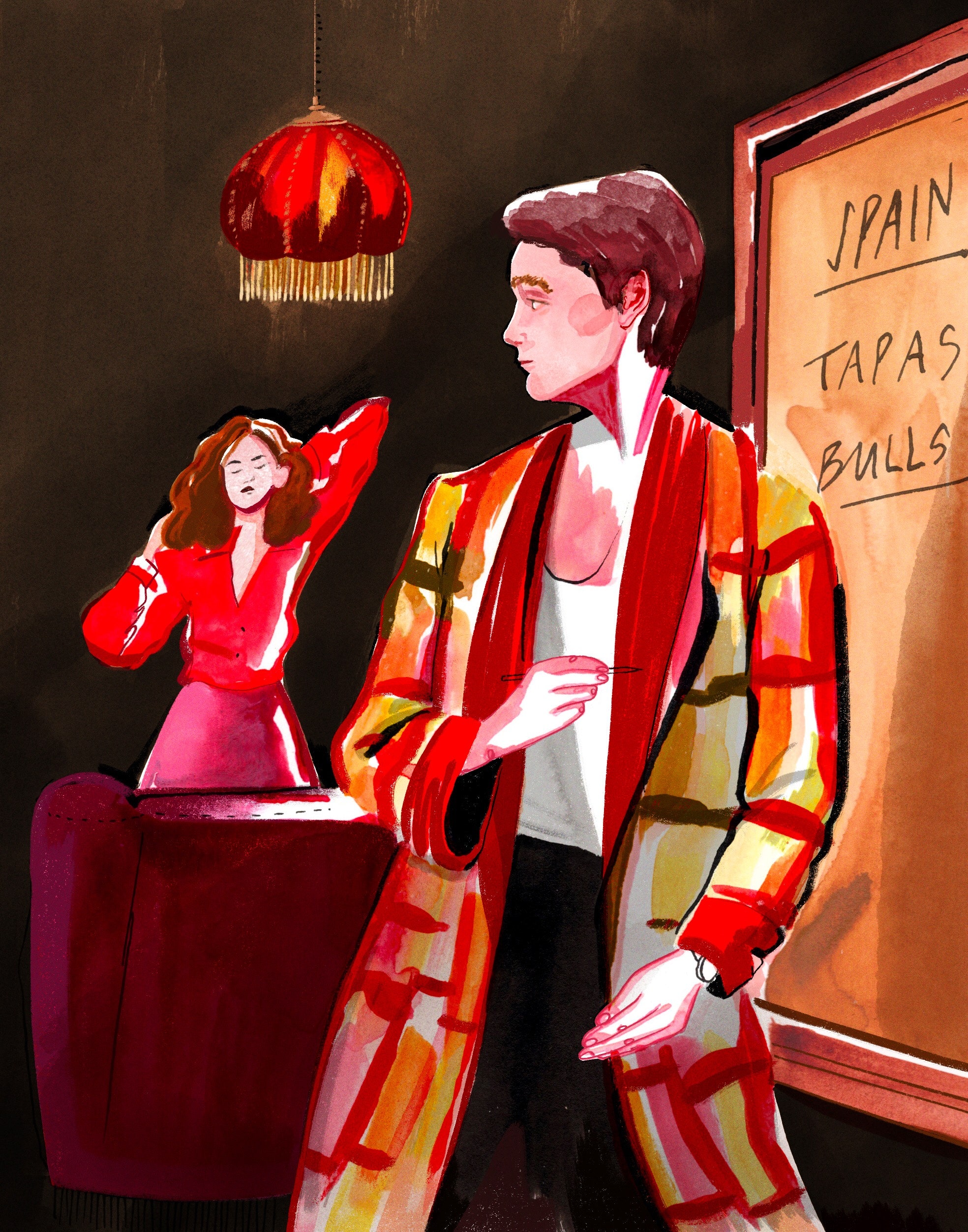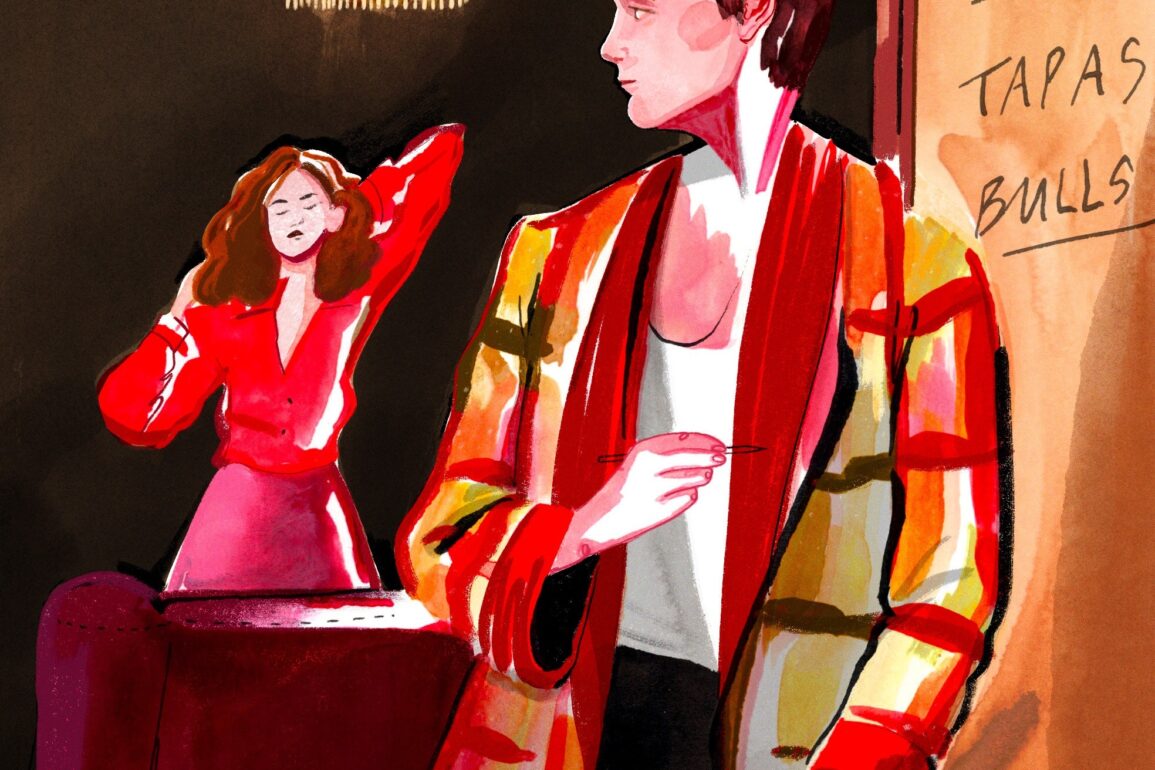The Terrifying Power of Art, in “Spain”

It’s 1936, and Helen (Marin Ireland) and Joris (Andrew Burnap), the couple and filmmaking team at the heart of “Spain”—a new play by Jen Silverman, directed by Tyne Rafaeli, at Second Stage’s Tony Kiser Theatre—have taken on a broad but curious challenge: make a movie about, you guessed it, Spain. Neither of them has ever been to the country. On a blackboard in their apartment, in the West Village, they write out all the words they can think of that might apply: “FIESTA,” “PAELLA,” “VINO”—the kinds of vague ideas that cling unconsciously to the brain and bubble up under ignorant duress.
You might wonder why they’d choose a subject so unsuited to their experience, but Silverman makes it clear from the start that they weren’t given a choice. Joris and Helen work, covertly, as propagandists—or, according to Silverman’s script, “infiltrators”—for the K.G.B. “They weren’t calling themselves that, obviously, it was the Office of the Branch of International Cultural Socialist Whatever Whatever,” Joris says in a monologue addressed to the audience, trying to clarify exactly what sort of work he’s been up to. “But—the KGB.”
They work under the supervision of an agent they call Karl (Zachary James), who, we later learn, loves opera and may or may not be gay. Otherwise, he’s a total void. Joris is much more paranoid than Helen about even speaking their handler’s fake name:
What Karl and the foreign government he represents want is a film with a clear message about the Spanish Civil War, one that dovetails with the ideological and geopolitical goals of the Soviet Union: “The War In Spain Is A War Between The Rich And The Poor The Noble Peasant Crushed by The Rich Fascist,” Karl explains to Joris. “See? A Single-Sentence War.”
Joris and Helen are a romantic couple only at the behest of their faraway overlords. Joris thinks that there’s been something real between them all along; Helen seems less convinced. Helen is more rogue and wild in the performance of her duties: she says too much, often sharing with Joris details of her relationship with Moscow which aren’t necessarily for his ears. Joris is a nervous rule follower, grateful to finally make a feature-length film, however constrained in content and tenor. (“My last film? Fifteen minutes. The one before that? Ten. How long is Long? You know? Like . . . forty minutes?” he says, before he realizes that he’s going to get a full hundred and twenty minutes to tell a story about a place he’s never been.) In the propaganda film that is now her life, Helen’s been cast not quite as an artist-filmmaker—her true passion is Conceptualist cinema; she studied abroad and was promptly recruited—but as Joris’s helpful girlfriend and the administrator behind their movies’ logistics. Even as a traitor to her country, she can’t rise above its ruinous gender politics.
Burnap and Ireland work well together. Burnap—you may have seen him in Matthew Lopez’s “The Inheritance”—acts with a slow grace, using his hands and torso minimalistically, and his nervous gestures land like rumbling thunder. He’s riveting to watch because he makes his movements count. Ireland has a quicker heartbeat—she moves stutteringly, her body enacting the process of thinking out loud. Despite this flurrying approach, she’s no less precise than Burnap, and the contrast in their styles becomes a kind of dance. They’re nicely backgrounded by a dark, withholding set, designed by Dane Laffrey. Little trapdoors open up to show a shadowy Karl, or an ominous phone, or a radio set in who knows where. The specifics of the actors’ performances—and their grounding in the thirties—give way to a blank canvas of a backdrop, suggesting that this story could happen anytime, in any place.
The play is a bit reminiscent of the great FX show “The Americans,” which, from 2013 to 2018, featured Matthew Rhys and Keri Russell as Soviet spies in America, posing as a wholesome suburban married couple, with two kids, a lush lawn, and a white picket fence. Those characters, however, were, at least outwardly, respectable members of the upper middle class, while Helen and Joris are nineteen-thirties bohemians, useful to the Russians because of their artistic talents and, we gather, their connections within urban creative circles.
This milieu is key to Silverman’s message. The play is, above all, about the sometimes terrifying power of art—how it can be used to change, by minute degrees, the minds and hearts of a social set, or a generational cohort, or, God forbid, an entire mass-media-hypnotized populace. As dismissive as some artists, even now, tend to be about the political implications and possible ramifications of their work, you can’t deny that the powers that ring the boundaries of acceptable discourse—governments and corporations, deeply rooted and venerable institutions—treat the divine play of art with deadly seriousness.
Take today’s atmospherics: a war breaks out and writers lose invitations to festivals and public talks, magazine editors get run out of town by nervous boards of directors, collectors dump painters, and on and on. Art matters, whether artists like that fact or not.
“Spain” opens a new vein of interest when two of Helen and Joris’s famous friends join them. In need of a screenwriter, they hatch a clunky plan to entice the novelist John Dos Passos (Erik Lochtefeld) to take the job—only to provoke the jealousy of Ernest Hemingway (Danny Wolohan), who they feel is actually a better fit. But Dos Passos turns out to complicate the mission much more than either “infiltrator” could have anticipated. In “Spain”—as he was in real life—Dos Passos is a friend of the writer and translator José Robles, who supported Spain’s left-wing Republican government but nonetheless was disappeared during that government’s brutal war with the Franco-led reactionary Nationalists.
Robles’s fate caused a rift between the real-life Dos Passos and Hemingway. The actual politics get mostly elided here, sometimes to the show’s detriment—in a different era, Silverman’s play, with its Russian baddies and exotic spies, might itself have been used as a neat piece of anti-Communist propaganda. But the specifics of Francoist terror, understandably, aren’t her subject. Art’s power is.
At one point, Hemingway delivers a monologue that encapsulates many of Silverman’s themes. He wants the audience to know about a time when somebody sang him a song:
Later, he concludes:
It’s an unwieldy analogy, one that doesn’t quite scalpel its way into your brain. But you know what he means. One hopes that today’s artists—freighted with responsibility that they don’t always think to accept—do, too. ♦
This post was originally published on this site be sure to check out more of their content.





